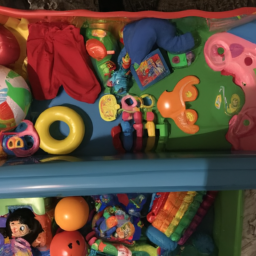Are you wondering what type of content is appropriate for your household, especially if there are children around? It can be challenging to navigate this topic, but don’t worry, we’re here to help! In this article, we’ll discuss the importance of age-appropriate content and provide some tips on how to ensure your family’s media consumption is safe and suitable for everyone. From movies and TV shows to books and video games, we’ll explore different forms of content and how to make informed choices for your household. So, stay tuned and let’s dive into this important conversation!
Curious to know more about how to choose the right content for your household, especially when there are children involved? Well, you’re in the right place! In this article, we’ll provide you with valuable insights and guidance on selecting content that aligns with your family’s values and promotes a safe and nurturing environment. We’ll delve into the world of ratings, parental controls, and educational resources that can aid you in making informed decisions. Whether it’s monitoring screen time, avoiding explicit material, or finding age-appropriate entertainment, we’ve got you covered. So, keep reading to empower yourself with the knowledge to create a content-friendly household for you and your loved ones!
Why is it important to consider children in the household?
Children are the heart and soul of any household. Their well-being and development should be a top priority for parents and caregivers. Understanding the impact on children’s well-being, ensuring their safety and security, and promoting healthy development are key factors in creating a nurturing and fulfilling environment for children to grow and thrive.
Understanding the impact on children’s well-being
Children are greatly influenced by their surroundings and experiences in the household. The environment they are raised in can have a significant impact on their mental, emotional, and physical well-being. Research has shown that children who grow up in a positive and supportive environment have a better chance of developing into confident and successful individuals. It is therefore crucial to consider their unique needs and provide the necessary support and guidance.
Ensuring their safety and security
Child safety is of utmost importance. It is essential to child-proof the living space to prevent accidents and injuries. This includes securing cabinets and electrical outlets, installing safety gates, and keeping hazardous materials out of reach. Taking these measures will not only ensure their physical safety but also give parents peace of mind.
Promoting healthy development
Creating a child-friendly environment involves more than just safety measures. Age-appropriate toys and activities should be provided to promote healthy development. Play is an essential part of childhood and contributes to various aspects of their growth, such as cognitive, social, and motor skills. Additionally, establishing routines can help children feel secure and provide structure to their daily lives.
The role of communication with children
Effective communication with children is crucial for understanding their thoughts, feelings, and needs. Open and honest conversations about sensitive topics, such as their emotions or difficult situations, build trust and encourage them to express themselves freely. Active listening and empathy are key components of effective communication. By listening attentively to children, parents can validate their emotions and help them navigate through challenges.
Encouraging expression of emotions
Children need a safe space to express their emotions without fear of judgment or punishment. Encouraging them to talk about their feelings and experiences can help them develop emotional intelligence and learn how to regulate their emotions. It is important to create an environment where they feel comfortable sharing their thoughts and worries.
Seeking professional help if necessary
Sometimes, children may require professional help to address emotional or behavioral issues. As parents, it is essential to recognize signs of emotional distress and seek assistance when needed. Mental health professionals can provide guidance and support tailored to each child’s individual needs.
Implementing effective discipline strategies
Discipline is necessary for children to learn boundaries and understand appropriate behavior. However, it is important to implement discipline strategies that are effective and respectful.
Setting clear boundaries and expectations
Children thrive when they have clear boundaries and expectations. By setting consistent rules and limits, parents can help children understand what is acceptable behavior. Communicating these boundaries in a clear and age-appropriate manner is essential to ensure that children comprehend and respect them.
Consistency in discipline methods
Consistency is key when it comes to discipline. Parents should strive to enforce rules consistently and avoid favoritism or inconsistency in disciplinary actions. This promotes a sense of fairness and helps children understand the consequences of their actions.
Positive reinforcement
In addition to setting boundaries, positive reinforcement is an effective discipline strategy. Acknowledging and praising children for their good behavior serves as motivation for them to continue making positive choices. Rewards and incentives can also be used to encourage and reinforce desired behavior.
Maintaining a healthy work-life balance
A healthy work-life balance is crucial for parents to devote quality time and attention to their children. It is essential to prioritize spending time together as a family and create lasting memories.
Prioritizing quality time with children
In a busy world, it is all too easy for parents to be consumed by work and other commitments. However, making a conscious effort to prioritize quality time with children is vital for their emotional well-being. Engaging in activities that they enjoy and actively participating in their lives helps build a strong parent-child bond.
Avoiding excessive work-related stress
Excessive work-related stress can have negative effects on both parents and children. High levels of stress can make it difficult for parents to be present and engaged. Finding healthy ways to manage stress, such as exercise or pursuing hobbies, can help create a more balanced and enjoyable home environment.
Fostering a supportive family environment
A supportive family environment is essential for a child’s overall well-being. This involves effective communication, mutual respect, and a sense of belonging. When parents work together to create a supportive and nurturing atmosphere, children feel secure and valued.
Promoting education and learning
Education plays a fundamental role in a child’s development. Parents should actively support their child’s educational journey by creating a conducive learning environment at home.
Creating a conducive learning environment at home
A quiet and dedicated space for studying can help children concentrate and focus on their schoolwork. Providing necessary materials, such as books, stationery, and educational resources, shows that education is valued and encouraged.
Engaging in educational activities
Beyond school, parents can engage children in educational activities that enrich their learning experience. This can include reading together, visiting museums and libraries, or engaging in age-appropriate educational games and puzzles. These activities foster a love for learning and stimulate their curiosity.
Supporting their academic journey
Parents should actively support their child’s academic journey by staying involved in their education. This includes attending parent-teacher conferences, monitoring homework and assignments, and advocating for their educational needs. By taking an active role, parents demonstrate the importance of education and encourage children to excel academically.
Encouraging physical and outdoor activities
Physical activity and time spent outdoors are crucial for children’s physical and mental well-being. Encouraging active play and limiting screen time are essential for promoting a healthy and active lifestyle.
Promoting active play and exercise
Children should be encouraged to engage in physical activities that promote strength, coordination, and cardiovascular health. This can include activities such as cycling, swimming, dancing, or participating in team sports. Regular exercise not only contributes to physical well-being but also improves mood and cognitive function.
Exploring nature and the outdoors
Spending time in nature has numerous benefits for children. It promotes creativity, imagination, and a sense of wonder. Outdoor activities, such as hiking, camping, or simply playing in the park, offer children the opportunity to explore and connect with the natural world.
Limiting screen time
Excessive screen time has been linked to various health problems, including obesity, sleep disorders, and behavioral issues. Setting limits on screen time and encouraging alternative activities, such as reading, arts and crafts, or playing outdoors, are essential for promoting a healthy and balanced lifestyle.
Addressing the emotional needs of children
Children’s emotional well-being is just as important as their physical health. Parents should create a supportive environment that addresses their emotional needs.
Recognizing signs of emotional distress
Parents should be vigilant in recognizing signs of emotional distress in their children. This can include mood swings, withdrawal, changes in appetite or sleep patterns, or sudden changes in behavior. Being aware of these signs allows parents to intervene and provide the necessary support.
Providing emotional support and reassurance
Children need emotional support and reassurance from their parents. Providing a safe space for them to express their feelings, listening without judgment, and offering words of encouragement can make a significant difference in their emotional well-being. Letting them know that their emotions are valid and that they are loved unconditionally creates a strong foundation for their emotional development.
Seeking professional help if necessary
If a child’s emotional distress persists or becomes severe, it is important to seek professional help. Mental health professionals can provide guidance, therapy, and support tailored to the child’s specific needs. Seeking professional help shows that their well-being is a top priority.
Ensuring balanced nutrition and healthy lifestyle
A balanced diet and healthy lifestyle play a critical role in a child’s growth and development. Parents should prioritize providing nutritious meals and snacks, encouraging regular physical check-ups, and fostering good sleep habits.
Offering nutritious meals and snacks
Children need a well-balanced diet that includes a variety of fruits, vegetables, whole grains, lean proteins, and dairy products. Providing nutritious meals and snacks not only fuels their growth but also contributes to their overall health.
Encouraging regular physical check-ups
Regular visits to the pediatrician ensure that children’s physical health is monitored and any potential issues are addressed promptly. Vaccinations, developmental screenings, and preventive care are essential for maintaining their well-being.
Encouraging good sleep habits
Adequate sleep is vital for a child’s physical and cognitive development. Establishing a consistent bedtime routine, ensuring a comfortable sleep environment, and limiting stimulating activities before bed can help children get the restorative sleep they need.
Conclusion
Creating a nurturing and fulfilling environment for children in the household is of utmost importance. By considering their unique needs and providing a supportive framework, parents and caregivers can foster their well-being and development. Understanding the impact on their well-being, ensuring their safety and security, promoting healthy development, and addressing their emotional and physical needs are essential components of creating a child-friendly environment. By prioritizing the well-being and development of children, parents lay the foundation for them to become confident and successful individuals. So, especially if there are children in the household, it is crucial to make their well-being a top priority and create an environment that supports their growth and happiness.

